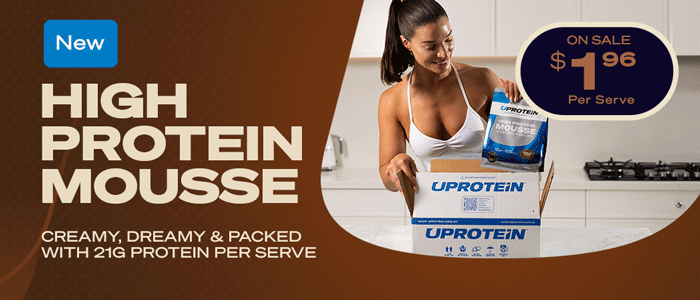HOW TO CHOOSE THE RIGHT PROTEIN FOR YOUR GOALS?
Posted by UPROTEIN on May 23, 2025

Dr Muriel Moes | Accredited Dietitian
11 min read

Choosing the right protein supplement can make a real difference in your training results. With so many protein options available, it’s important to understand how each one works, how much to take, and which suits your specific fitness goals, dietary preferences, and lifestyle. Whether you’re trying to gain muscle, lose fat, improve recovery, or support general health, the right protein supplement can help you get there faster and more effectively.
Before choosing a protein supplement, it’s essential to clearly define your primary goal. Protein plays a key role in muscle repair, growth, and overall health, but the right protein can vary depending on your focus. Below are the best protein options for each major fitness goal.

Best Protein For Muscle Gain
When you’re trying to build muscle, the best proteins are those that provide a quick supply of amino acids to stimulate muscle protein synthesis and recovery. Whey protein is the top choice for muscle gain because it’s fast-digesting and contains all the essential amino acids (EAAs) required for muscle growth. It’s ideal for post-workout recovery since it’s quickly absorbed by your body. For those with a sensitive stomachs, look for low lactose protein formulations or those with added digestive enzymes like 100% Whey Protein Hydro + Enzymes or Whey Protein Isolate that can help breakdown protein. If you prefer something slower, casein protein is another great option because it digests slowly, ensuring a steady supply of protein for muscle repair over several hours Our overall and recommended choice for the best protein for muscle gain is our most popular 100% Whey Protein Hydro + Enzymes shown here, which we consider a performance protein powder.
Best Protein for Fat Loss
For fat loss, you need a protein that supports muscle retention while keeping your overall calorie intake in check. Lean and low carb protein, such as whey isolate, protein water or plant-based proteins like pea or soy protein, are excellent for fat loss. These protein types are low in fat and carbs, so they can help you maintain muscle mass while creating a calorie deficit for fat loss. In addition protein powder formulas containing added thermogenics ingredients (ingredients designed to boost metabolism) can help support both fat burning and muscle growth, because they promote both muscle tone and increases in calorie burn. Thermo Burn protein ticks all boxes for those looking for a high protein, low carb and metabolsim boosting recovery shake. Micellar Casein is also a good choice for fat loss because it keeps you feeling full longer, which can help control hunger throughout the day and lower daily calorie intake. It's worth noting Casein protein mixes much thicker than traditional protein shakes, which gives it the slow release properties. We've all heard of Meal Replacement shakes for fat loss, but do they work? The primary goal of meal replacement formulation is allow the skipping of meals in an overall effort to reduce daily calorie consumed. Ensuring you choose the best meal replacement shake means your body does not miss out on key nutrients when skipping meals.
Best Protein for Mass
For muscle mass, you need a protein that supports high calories, and the right balance of protein and carbohydrates to fuel gains. Mass protein, such as Mass Gainer Pro + MCT, are excellent for weight gain because they are specifically formulated to contain a nutrient dense and high energy blend. These protein types are high in carbohydrates and protein ideally in a 60% carbohydates and 40% protein ratio. They can help build muscle mass while creating a calorie surplus for those with faster metabolisms and those who struggle to keep weight on. Look for formulas which contain multiple types of both fast and slow digesting whey protein, or additional ingredients like MCT (medium chain triglycerides) derived from coconut extracts, which can help boost energy and richer calorie levels. Pro Tip: To increase calories further, consider mixing with full cream milk. This may increase sweetness, as milk contains sugar, and in some individuals increase lactose discomfort, but the end result could be a protein shake with over 800 calories!
Best Protein for General Health & Ageing
For general health and ageing, a protein that is both versatile and nutritionally complete is ideal. Whey protein is an excellent option for general health and as we age because of its high biological value, meaning it’s well-utilised by the body for muscle repair, immune support, and overall wellness. With so many options, often it can become overwhelming to decide. For most people looking to boost daily protein intake to support their muscle health, an expensive performance protein is not needed. Consider High Protein Active Whey for its high protein content with over 30g per serve, rich in naturally occurring amino acids to support muscle recovery and fuel your active lifestyle, not to mention its affordability compared to anything else on the Austalian market! If you follow a plant-based protein diet or have dietary restrictions, soy protein or pea protein are a great option for general health. Soy protein is a complete protein that works similarly to animal proteins, offering all nine essential amino acids.
For those who are lactose intolerant or follow a dairy-free diet, whey isolate or pea protein are great alternatives. Whey isolate contains minimal lactose compared to regular whey concentrate, making it a better choice for people with mild lactose intolerance. Pea protein is also naturally dairy-free and easy on the stomach, making it suitable for those who want to avoid dairy products altogether.
Best Protein for Recovery
After an intense workout, recovery is key to ensuring your muscles repair and grow stronger. For rapid recovery, fast-digesting proteins like whey protein isolate are essential because they quickly replenish amino acid levels and accelerate muscle repair. If you want sustained recovery over a longer period, casein protein can help by providing a slow-release of amino acids, perfect for overnight recovery or between meals when a fast-acting protein isn’t needed. While nearly all protein powders can support muscle recovery, for elevated levels of recovery support, consider amino acids. You can combine amino acids with protein shakes or consume them at different times, including before, during or after your workout. Amino Acids like BCAA Supplements and Glutamine Supplements can play a key role in muscle recovery for those who regular exercise and need the best recovery supplementation so they can train longer with more frequency.
Gluten-free diets
Those following a gluten-free diet should opt for gluten-free protein powders such as whey protein, pea protein or soy protein. Be sure to check the labels, as some protein powders may contain cross-contaminants or added ingredients that contain gluten. Always choose an option that list the gluten as being 'not present' or 'not detected' if you are coeliac or gluten intolerant. At Uprotein we dont use gluten ingredients in any of formulations, so you can be rest assured our protein powders are gluten free, with the addition of perdiocually batch testing.
Lifestyle and convenience factors
Apart from dietary preferences, your lifestyle and convenience should be taken into account when choosing a protein. Whether you’re someone who’s constantly on the go or you prefer a protein that’s easy to mix and incorporate into meals, here are some lifestyle factors to consider:
1. Time of day and convenience
If you’re often short on time, choose a protein that’s easy to consume and quick to prepare. Whey protein is great for busy individuals because it mixes well with water or milk and is easy to consume immediately after a workout. For those who want a more substantial, slower-digesting option, casein protein is a good choice before bed or during times when you can’t eat a full meal.
2. Taste and texture
Protein powders come in a wide variety of flavours and textures. Some people prefer the smooth texture and rich taste of whey protein, while others might enjoy the nutty flavour of plant-based proteins like soy or pea protein. If you have specific texture or flavour preferences, be sure to test out a few options before settling on one that suits your taste.
3. On-the-go options
If you're looking for convenience, protein shakes and bars are an easy and portable option. Many protein brands, offer protein bars or ready-to-drink protein shakes that require no mixing or preparation. These are ideal for busy individuals who need a quick protein source without extra effort.
Choosing protein supplements based on your goals
When selecting the best protein for your goals, here’s a quick guide to match protein types to your specific fitness and health objectives:
For Muscle Gain: Whey, Protein Blends
- Fast absorption and high amino acid profile for rapid muscle growth.
- 100% Whey Protein | Whey Protein Isolate Premium + XHL | Micellar Casein Night Recovery
For Muscle Mass: Mass Gainer
- High in calories to support a daily calorie surplus to slow down metabolism.
- Mass Gainer Pro + MCT.
For Fat Loss: Lean Protein, Protein Water & Casein
- Low in carbs and fats, protein water made from clear whey isolate and micellar casein which provides steady amino acid release to minmise hunger and muscle loss, allowing you consume less daily calories.
- Whey Protein Isolate Premium + XHL | Clear Whey Protein | Premium Meal Replacment + MCC
For Recovery: Whey, Casein, Soy
- Whey for quick recovery, casein for sustained release, and soy for plant-based recovery.
- Micellar Casein Night Recovery
For Vegan/Dairy-Free: Soy, Pea Protein
- Plant-based, hypoallergenic proteins suitable for vegans and those with sensitivities.
For General Health & Ageing: Whey, Meal Replacement, Soy, Pea Protein
- Complete protein sources that support muscle, immunity, and overall health.
- High Protein Active Whey | Premium Meal Replacment + MCC.
Dosing recommendations
Protein requirements depend on several factors, including body weight, training intensity, and goals. A typical serving size of protein ranges from 20 to 35 grams, but this can be adjusted based on how much protein you need based on individual needs. Consuming protein post-workout helps repair and grow muscle tissue, while casein before bed provides long-term muscle support.
Timing protein intake
For optimal results, consume fast-digesting proteins like whey immediately after workouts. If you’re aiming to enhance recovery overnight, casein protein before bed is highly effective. For muscle gain or weight management, aim for protein every 3–4 hours to maintain a steady supply of amino acids to your muscles.
Choosing the right protein is crucial for achieving your fitness goals. Whether you're aiming for muscle gain, fat loss, recovery, or general health, understanding the different types of protein—like whey, casein, soy, and pea—will help you make an informed decision. Make sure to consider your dietary preferences, lifestyle factors, and fitness objectives when selecting the best protein for you.
Explore our full range of protein powders and sports supplements to find the ideal supplement tailored to your unique goals. Need some help? Get in touch with our team now.






